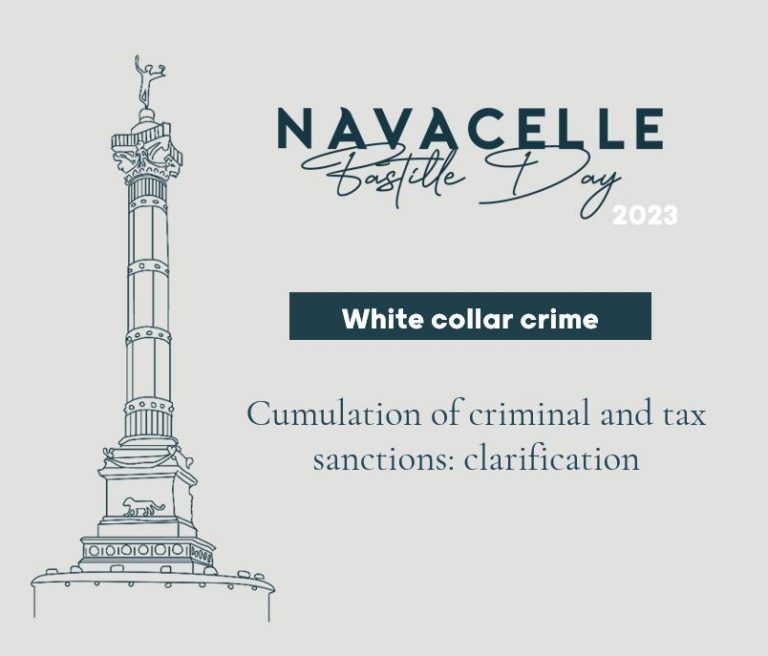On May 9, 2023, The Minister for public finance presented a plan to fight tax fraud, insisting on the need to focus on fraud committed by the “ultra-rich” and “multinationals”[1]. He announced a 25% increase in tax audits on the wealthiest individuals by 2027, as well as the implementation of automatic audits every two years for the top-100 companies in France[2].
He also emphasized on the government’s ambition to strengthen sanctions, in particular through community service and the creation of a tax and civil disgrace[3]. The creation of a tax intelligence service is also considered, through which members of financial institutions could be paid in exchange for information on fraudsters[4].
During a speech in January 2023, Gabriel Attal had announced this plan to fight tax, social and customs fraud and outlined the benefits of the Judicial Convention of Public Interest (“CJIP”), underlining that the French State would be able to recover a significant part of the amounts related to fraud through this mechanism. He also highlighted the fact that the CJIP allowed to avoid long and costly procedures against large companies, in addition to mitigating the risk of reduction of the fine in case of appeal[5].
He also welcomed the reform of the Bercy lock, and highlighted the challenges ahead, due to the increase in the number of cases handled by the criminal courts[6].
The Minister’s speeches and this anti-fraud plan follow the publication by the Senate Finance Committee of a report by the “Mission d’information relative à la lutte contre la fraude et l’évasion fiscale”[7].
In this report, the Finance Commission insisted on the challenge in assessing the effectiveness of the fight against tax fraud, and made 20 recommendations to strengthen it, divided into 4 areas[8]:
- Strengthening the efficiency of the judicial response to tax fraud;
- Improving the fight against VAT fraud;
- Securing data-access tools; and
- Rolling out new mechanisms to fight abusive tax arrangements at an international level.
The Senate welcomes the efficiency of the judicial response to tax fraud reinforced by judicial agreements
The report draws a positive assessment of the deployment of the CJIP and of the French guilty plea (“CRPC”) in tax fraud cases, which allow for the efficient handling of highly complex cases.
The report notes that the interest of the CJIP does not lie, for the State, in limiting the duration of criminal proceeding but rather in the response provided to highly complex fraud cases, mitigating the risk of not recovering the sums at stake and to obtain the payment of penalties[9].
With regards to guilty pleas, the report outlines that they allow to deal more quickly with the simplest cases of tax fraud and that it is, according to the specialized magistrates of the Paris judicial court, well adapted to tax fraud litigation and to the profile of the persons prosecuted in this context[10].
The report notes that in 2021, 120 defendants were convicted under a CRPC for tax fraud, i.e., 16% of convictions, whereas only 26 defendants, i.e., 4%, were concerned in 2019. It also notes that the number of CRPCs has almost quadrupled in three years, from 23 in 2019 to 60 in 2020 and 111 in 2021. The evolution of the median and average amounts of fines imposed also confirms, according to the Finance Commission, the choice to make greater use of this procedure, having respectively increased from € 8,000 to € 10,000 and from € 34,167 to € 68,354 between 2019 and 2021[11].
The report thus recommends supporting the full appropriation and deployment of the CJIP and CRPC mechanisms in tax fraud cases[12].
The French Senate recommends additional measures to strengthen the effectiveness of the judicial response to tax fraud
The report also insists on the effectiveness of the reform of the “Bercy lock” to strengthen the judicial response to tax fraud. Since its entry into force in January, 2019, the cases referred to the public prosecutor’s office have increase by 75%[13]. Thus, the procedure of automatic transmission of cases has experienced a strong increase since the number of mandatory denunciations has risen from 965 in 2019 to 1217 in 2021, corresponding to an increase of over 25%[14].
The report also discusses the allocation of tax fraud cases between the various prosecutors, as provided for in the memorandum of the Ministry of Justice on tax fraud of October 4, 2021[15]:
Referral of the case to the French specialized inter-regional jurisdictions (“JIRS”) must be considered in each case transmitted by the tax administration and presenting criterion of high complexity: complex set-up, need to resort to international criminal mutual assistance, fraud schemes involving tax fraud, links with organized crime networks or related offenses involving organized crime;
The referral to the French jurisdiction in charge of the fight against organized crime (“Junalco”) should be considered for the most complex cases, for example, those resulting from a planned and concerted action of a structured criminal organization or group (e.g., mafia);
The French national financial prosecutor’s (“PNF”) priorities are to deal with sophisticated tax fraud committed by individuals (e.g., concealment of assets or wealth abroad), to prosecute highly technical and large-scale fraud committed by legal entities (e.g., transfer pricing, abuse of rights or permanent establishment issues) and to hold criminally liable those who facilitate complex tax fraud and its laundering (e.g., institutional banking and financial intermediaries, legal advisors). It is therefore usual that the PNF deals with “leaks” or “Papers” cases and intervenes in cases of presumed tax fraud.
Finally, the report recommends certain adjustments to follow up on the reform of the “Bercy lock” and supporting the judicial investigation service of the finance ministry through various measures:
Clarifying the conditions for lifting professional secrecy between public finance officials and the public prosecutor provided for in Article L. 142 A of the French Tax Procedures Code by establishing that, with the authorization of the public prosecutor, secrecy may also be lifted for specialized assistants[16],
- Reducing the number of members of the tax offences commission from 28 to 16 to adapt to the decrease in its activity[17],
- Increasing the number of judicial tax officers from forty to twice that number within five years[18], and
- Extending the jurisdiction of judicial tax officers to include VAT fraud[19].
Some of the recommendations of the Senate report were included in the 2023 budget law, but several were censored by the Constitutional Council on 29 December 2022, for being outside the scope of this type of law. This was notably the case for a disposition which was supposed to improve the exchange of information between the Customs and the judicial authorities. It is therefore possible that a new law be discussed regarding the fight against tax fraud in 2023[20].











